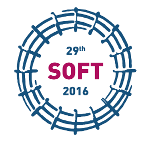Speaker
Paul-Martin Steffen
(Institute of Energy and Climate Research – Nuclear Waste Management and Reactor Safety (IEK-6))
Description
In case of a severe accident inside the ITER fusion facility, there exist several scenarios in which hydrogen may be produced and released into the suppression tank. Assuming the accidental ingress of air, the formation of flammable gas mixtures may lead to explosions and severe component failure. One option to mitigate such hypothetical scenarios is the installation of passive auto-catalytic recombiners (PARs), which are presently used as safety devices inside the containments of nuclear fission reactors. PARs convert hydrogen into water vapour by means of passive mechanisms and support the prevention of large accumulations of combustible gases. In cooperation between IRSN (France), Forschungszentrum Jülich (Germany) and RWTH Aachen University (Germany), the operation of PARs inside the suppression tank under accident conditions is investigated.
Experimental investigations of PAR operation have been performed with a scaled-down model of a conventional PAR inside the REKO-4 facility (Jülich), a pressure vessel with a volume of 5.3 m³. A first low-pressure test series has been performed with gauge pressures between -0.8 and 0 bar, and hydrogen concentrations of up to 6 vol.%.
The test results show a strong dependence of the pressure on the PAR start-up behaviour. The start-up delay is proportional to the pressure level. Furthermore, the recombination rate is significantly reduced with decreasing pressure. The experimental results provide valuable information on PAR operation under challenging conditions for model development and the assessment of PAR performance under accidental conditions.
Co-authors
Ahmed Bentaib
(PSN-RES/SAG/B2EGR, Institut de Radioprotection et de Sûreté Nucléaire (IRSN), 92262 Fontenay-aux-Roses, France)
Ernst-Arndt Reinecke
(Institute of Energy and Climate Research – Nuclear Waste Management and Reactor Safety (IEK-6), Forschungszentrum Jülich GmbH, 52425 Jülich, Germany)
Hans-Josef Allelein
(Institute of Energy and Climate Research – Nuclear Waste Management and Reactor Safety (IEK-6), Forschungszentrum Jülich GmbH, 52425 Jülich, Germany;Institute for Reactor Safety and Reactor Technology (LRST), RWTH Aachen University, 52072 Aachen, Germany)
Nabiha Chaumeix
(Institut de Combustion Aérothermique Réactivité et Environnement (ICARE), Centre National de la Recherche Scientifique (CNRS), 45071 Orléans, France)
Nicolas Meynet
(PSN-RES/SAG/B2EGR, Institut de Radioprotection et de Sûreté Nucléaire (IRSN), 92262 Fontenay-aux-Roses, France)
Paul-Martin Steffen
(Institute of Energy and Climate Research – Nuclear Waste Management and Reactor Safety (IEK-6), Forschungszentrum Jülich GmbH, 52425 Jülich, Germany)

